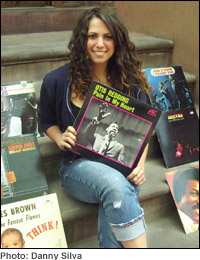 Graduating from Wesleyan University on my 22nd bir thday, I was plagued with that demoralizing question: “What are you going to be when you grow up?” In the ideal world, an honest day’s work—starting at noon of course—would include listening to music, seeing it live and reading and writing about it. Not one to dwell on fantasy, I resigned myself to the dry, nineto-five existence of book publishing my English major supposedly prepared me for, and went on the hunt.
Graduating from Wesleyan University on my 22nd bir thday, I was plagued with that demoralizing question: “What are you going to be when you grow up?” In the ideal world, an honest day’s work—starting at noon of course—would include listening to music, seeing it live and reading and writing about it. Not one to dwell on fantasy, I resigned myself to the dry, nineto-five existence of book publishing my English major supposedly prepared me for, and went on the hunt.
Online job sites only confirmed rumors about the horrors of the “real” world. After stumbling upon the Assistant Publisher position at Elmore, I eagerly applied, but heard nothing, so I begrudgingly accepted my fate and became another anonymous cog in a multi-million dollar publishing company. Predictably, I engaged in painfully menial labor. My challenges: walking to the bathroom in heels and struggling to discover an element of my job to embrace. After four weeks of number crunching, I got a call from Elmore. It took me about two minutes to give up health benefits, a larger salary and my fluorescently-lit cubicle in exchange for a dream job. Then it got better.
Promoted to Managing Editor, this proves the ideal issue for me to write my first editorial letter. While I can’t pinpoint the moment when I fell in love with soul, I also can’t remember a time when I didn’t love Otis Redding. The gospel-inspired vocals of Ray Charles and Aretha Franklin blasted, full volume, from my stereo and James Brown’s heavy bass arrangements stimulated dancing that should’ve been limited to the privacy of my own room. Hearing my boyfriend’s vinyl Wilson Pickett album was the tipping point between hobby and obsession. The song “In the Midnight Hour,” with Pickett’s exhilarating high-energy shouts, expressed at once the power of religious and sexual ecstasy. Soul had it all: the perfect mix of the sacred and the secular, a vocalist with a powerful set of pipes and the best backing bands an artist can ask for—with Booker T. and the MG’s, the Swampers, Bootsy Collins, and Duane Allman as the supporting players. It’s called soul for a reason; it feeds the spirit. Whether somber or lively, the music, always hair-raising, sets the blood afire, sending that tingle down the spine.
It may seem that I’m living in the past, idolizing the Stax heyday and that classic Muscle Shoals sound, but soul music’s existence isn’t limited to the past. It exists in the present with artists who are ready to entertain old-school fans with new music that is very much linked to the past. Sharon Jones and the Dap-Kings, Eli “Paperboy” Reed and the True Loves, and Ryan Shaw (among others) are releasing new albums and touring to support them. Soul music isn’t dead, it just went out of fashion for a while, moved aside by the industry to make room for more marketable genres. Luckily, despite the turbulent state of the music business, this is an exciting time for soul fans, and I’m in the right spot at the right time.
—Ali Green



Be the first to comment!